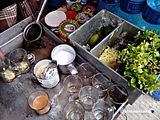Use Some energy saving tips: Save your money, Nation and Planet
Here we give some
energy saving tips. These tips are easy enough to do, while others may
require more effort and investment, but promise big savings over the
years. We encourage you to check out these tips ( also check related
energy saving tips in internet) and make improvements today and this
year that will contribute to your energy bottom line and make our planet
healthier and cleaner!
1) Exterior
lighting is one of the best places to use CFLs because of their long
life. If you live in a cold climate, be sure to buy a lamp with a cold
weather ballast since standard CFLs may not work well below 40°F.
Use
CFLs in all the portable table and floor lamps in your home. Consider
carefully the size and fit of these systems when you select them. Some
home fixtures may not accommodate some of the larger CFLs.
Turn
off the lights in any room you're not using, or consider installing
timers, photo cells, or occupancy sensors to reduce the amount of time
your lights are on.
Install
task lighting - such as under-counter kitchen lights or bathroom mirror
lights - to reduce the need for ambient lighting of large spaces.
Installing
a skylight can provide your home with daylighting and warmth. When
properly selected and installed, an energy-efficient skylight can help
minimize your heating, cooling, and lighting costs.
2) Turn off your computer and monitor when not in use.
There
is a common misconception that screen savers reduce energy use by
monitors; they do not. Automatic switching to sleep mode or manually
turning monitors off is always the better energy-saving strategy.
Consider buying a laptop for your next computer upgrade; they use much less energy than desktop computers.
To
maximize savings with a laptop, put the AC adapter on a power strip
that can be turned off (or will turn off automatically); the transformer
in the AC adapter draws power continuously, even when the laptop is not
plugged into the adapter.
3) Plug
home electronics, such as TVs and DVD players, into power strips; turn
the power strips off when the equipment is not in use (TVs and DVDs in
standby mode still use several watts of power).
4) Start
closing your refrigerator. You see, your refrigerator takes a ton of
electricity to maintain. By opening it consistently you are using a lot
more energy. You can cut on this by closing as soon as you are finished
looking.
5) Turn
off kitchen, bath, and other exhaust fans within 20 minutes after you
are done cooking or bathing; when replacing exhaust fans, consider
installing high-efficiency, low-noise models.
6) During
the heating season, keep the draperies and shades on your south-facing
windows open during the day to allow the sunlight to enter your home and
closed at night to reduce the chill you may feel from cold windows.
During the cooling season, keep the window coverings closed during the
day to prevent solar gain.
7) Never
wash dishes or laundry with out a full load. It is just a waste of
water and electricity. Instead, make sure that both are always for the
the maximum aloud. Then you may turn it on and wash your clothes or
dishes. If you are washing a small load, use the appropriate water-level
setting.
When
shopping for a new clothes dryer, look for one with a moisture sensor
that automatically shuts off the machine when your clothes are dry. Not
only will this save energy, it will save wear and tear on your clothes
caused by over-drying.
8) Drive sensibly. Aggressive driving (speeding, rapid acceleration and braking) wastes gasoline.
Use air conditioning only when necessary.
Keep tires properly inflated and aligned to improve your gasoline mileage by around 3.3%.
Use
the grade of motor oil recommended by your car's manufacturer. Using a
different motor oil can lower your gasoline mileage by 1%-2%.
Get
regular engine tune-ups and car maintenance checks to avoid fuel
economy problems due to worn spark plugs, dragging brakes, low
transmission fluid, or transmission problems. Replace clogged air
filters to improve gas mileage by as much as 10% and protect your
engine.
9) Unplug battery chargers when the batteries are fully charged or the chargers are not in use.















No comments:
Post a Comment